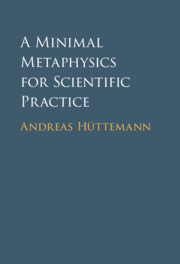Book contents
- A Minimal Metaphysics for Scientific Practice
- A Minimal Metaphysics for Scientific Practice
- Copyright page
- Contents
- Figures
- Acknowledgements
- Introduction
- Chapter 1 Laws of Nature and Their Modal Surface Structure
- Chapter 2 The Problem of Ceteris Paribus Clauses
- Chapter 3 Causation – Conceptual Groundwork
- Chapter 4 Causation – Application and Augmentation
- Chapter 5 Reductive Practices
- Chapter 6 Reduction and Physical Foundationalism
- Chapter 7 Reduction and Ontological Monism
- Chapter 8 Concluding Remarks: Methods and Epistemic Sources in Metaphysics
- Bibliography
- Index
Chapter 5 - Reductive Practices
Published online by Cambridge University Press: 04 August 2021
- A Minimal Metaphysics for Scientific Practice
- A Minimal Metaphysics for Scientific Practice
- Copyright page
- Contents
- Figures
- Acknowledgements
- Introduction
- Chapter 1 Laws of Nature and Their Modal Surface Structure
- Chapter 2 The Problem of Ceteris Paribus Clauses
- Chapter 3 Causation – Conceptual Groundwork
- Chapter 4 Causation – Application and Augmentation
- Chapter 5 Reductive Practices
- Chapter 6 Reduction and Physical Foundationalism
- Chapter 7 Reduction and Ontological Monism
- Chapter 8 Concluding Remarks: Methods and Epistemic Sources in Metaphysics
- Bibliography
- Index
Summary
I distinguish various different ways in which reductive practices are important in some sciences. I will focus in particular on various kinds of theory reduction and of explanatory reduction. In the second part of the chapter I argue that the rationale for both theory reduction and explanatory reduction can be explicated in terms of our interest in achieving an understanding of how different descriptions of either one system (part-whole explanations) or classes of systems (theory reduction) are related. If we are confronted with different accounts of a class of systems (in the case of theory reduction) or of one system (e.g., accounts of the behaviour of one system in terms of different disciplines/vocabularies) we want these accounts to fit together. In the case of theory reduction we want to understand why a superseded theory was successful in the past and why we should continue to apply it. In the case of reductive part-whole explanations we want to understand why the description of the compound system and those of the parts and their interactions yield the same predictions ‘micro-macro coherence’).
Information
- Type
- Chapter
- Information
- A Minimal Metaphysics for Scientific Practice , pp. 129 - 158Publisher: Cambridge University PressPrint publication year: 2021
